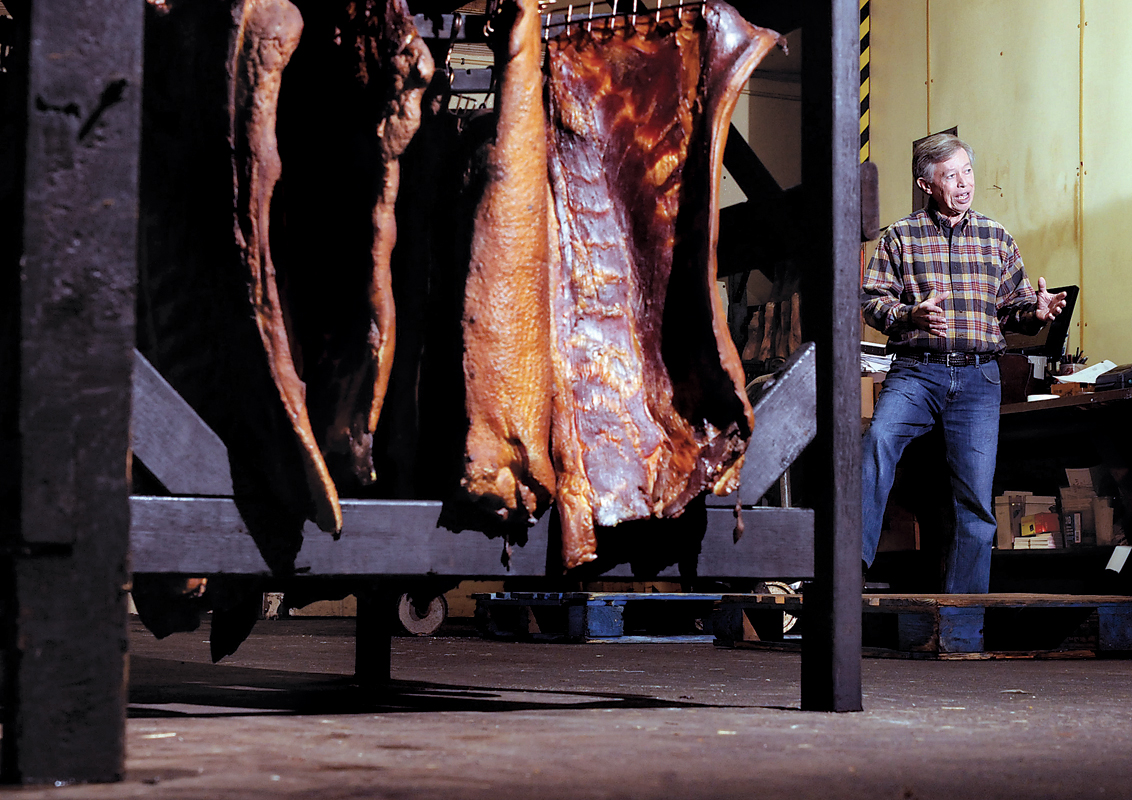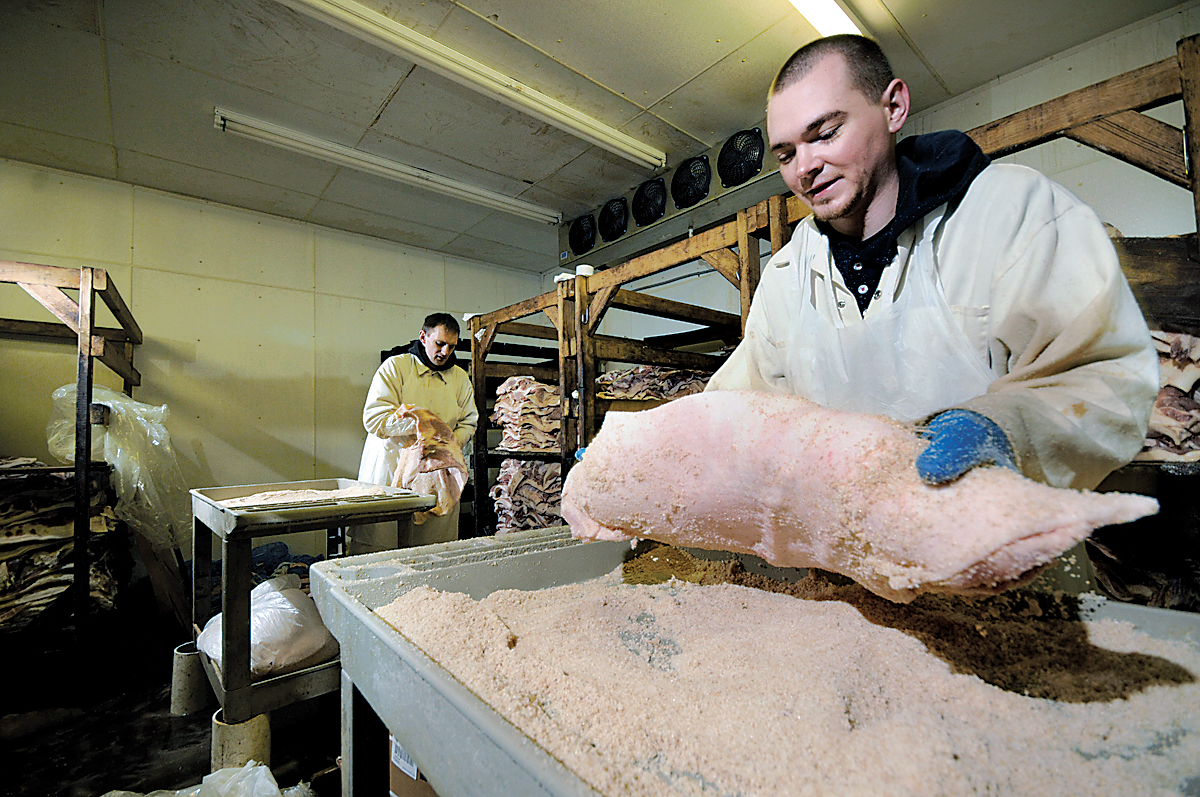Cooking Benton's baconAccording to Allan Benton, just fry it till it's barely crisp around the edges and "bendable" in the center. But make sure it's cooked slowly so it gets cooked through.
GET A TASTEBenton's Smoky Mountain Country Hams supplies several Chattanooga restaurants, including:• Alleia, 25 East Main St.• The Blue Plate, 191 Chestnut St.• Public House, 110 Market St.• St. John's Restaurant, 1274 Market St.• 212 Market, 212 Market St.• Home cooks can find Benton's bacon (no ham) at Pruett's Market, 1210 Taft Highway, Signal Mountain; or ham, bacon and proscuitto at the Benton Smoky Mountain Hams store, located at 2603 Highway 411 North, Madisonville. Or order from bentonscountryhams2.com.OUTSIDE CHATTANOOGAA look at some of the creative ways chefs are using Benton's bacon and ham.• David Chang, Momofuku, New York: Corn with Benton's bacon and miso butter.• Hugh Atcheson, The National, Athens, Ga.: Empanada stuffed with Benton's Tennessee prosciutto, Spanish cheddar and scallions.• Sean Brock, Husk, Charleston, S.C.: "We have their ham in the bar and you just slice it as you want it. You eat that country ham and you drink it with bourbon, there is nothing else in the world that matters. It's the smoke. Nobody uses as much smoke as he does. It is outrageous. If you put the tiniest amount of Benton's bacon into anything, it's like MSG, it just makes it. It's just incredible." (As told to findeatdrink.com)• Chefs Josh Habiger and Erik Anderson, The Catbird Seat, Nashville: Cornball injected with Benton's bacon pudding.
MADISONVILLE, Tenn. - Smoke creeps out of the tiniest crevices as Allan Benton approaches the doors of the smokehouse, located in the rear of an unassuming building along Highway 411.
He unlocks the doors and, as they open, Benton disappears, engulfed in a haze of smoke heady with the smells of burning hickory. When the smoke clears, what revealed is rack upon rack of bacon that's been curing and hanging for weeks, waiting to be hauled over to the smokehouse.
"We'll smoke the heck out of them for three days," Benton says.
Benton's Smoky Mountain Country Hams is home to hams and bacon cured in a time-honored fashion, one that Benton learned growing up in the mountains of Southern Virginia's Scott County.
In a family event that included his parents as well as both his maternal and paternal grandparents, "we'd butcher hogs every year on Thanksgiving Day," he says. "We'd cure our own bacon and hams and make our own sausage, too. We used every part of the pig."
Like many college-bound kids of the 1960s, Benton "was determined to change the world." So following graduation and with a bachelor's degree in education and a master's in counseling, he set out to do so.
But when he returned to Madisonville to take a job as a guidance counselor, he took one look at the pay scale and realized he couldn't survive on the meager salary. So he made a decision to go back to what he grew up doing -- curing and smoking pork.
Now, he's on a first-name basis with some of the nation's top chefs who prize his pork, including restaurants in New York, Charleston and Nashville .
Benton says more than 70 percent of his product is shipped out by UPS to points east, west, north and south every weekday.
"We have 80 or 90 restaurants in New York city, a growing presence in Chicago. San Francisco is a really big market. And a lot goes to Napa Valley, too. And to New Orleans and Charleston, S.C."
The Big Easy is no stranger to Benton's pork. Famed chef Emeril Lagasse prefers Benton's ham and bacon more than any other, said executive sous chef Tabb Singleton of New Orleans' NOLA Restaurant, one of several of Lagasse's eateries nationwide.
"We have a lot of people who come in and try it and ask about it," Singleton says. "The bacon has such a good, heavy smoked flavor that's different from other bacons. Everyone who's had it likes it."
Ray Billalobos, chef de cuisine at Chicago's Table 2, says his guests can't get enough of Benton's products, either. Servers bring Benton proscuitto to the table with housemade pickles and other relishes, along with select cheeses. The restaurant also uses fat from Benton's bacon for cornbread.
"Mr. Benton and his products are amazing," Billalobos says.
Restaurateur Rob Gentry, owner of The Blue Plate in downtown Chattanooga, has Benton products on both restaurant and catering menus.
"Allan has been a cheerleader for quality regional food for years," he said. "He's all about quality. He's known for buying and sourcing the best pork in the United States. He's told me to stick to my guns about quality, too."
Diners crave Blue Plate's Summertime BLT, once served only in the summer but so popular Gentry was encouraged to keep it on the menu year-round.
"No doubt it's because of the bacon," Gentry said.
Where it began
Forty years ago, Benton bought an existing, though small-scale, ham business in Madisonville and started curing hams and bacon, mostly for local consumption.
"I wrote to every university in the South, asking for their ideas on how to cure hams," he says. "I told myself, 'This isn't rocket science. I can do this.'"
He played around with techniques and tried a few different rubs, but when all was said and done, he went back to the way his grandparents had done it all those years ago: a rub made from salt and brown sugar for the bacon with smoked red pepper added for ham.
"It's the original recipe from the old smokehouse behind the cabin I was born in," he says.
Along with the rubs, he uses only hickory or apple wood in his smokehouse.
"We're doin' the hams about the same way we did 'em 40 years back," says Arthur Atkins, who has been a part of Benton's Smoky Mountain Country Hams since its beginnings. Atkins is one of 12 employees who work curing, smoking, slicing and packaging.
Walk through the front door of Benton's store and your senses are struck by the rich smell of hickory and the invitingly sweet smell of applewood, combined with years of smoke and spices that have settled into fabric of the building. Directly in front of you is a refrigerated case with pork products ready for purchase while to your right is an open door leading to a room where workers slice the cured meats and wrap them for shipping. Look beyond, toward the rear, and slabs of bacon and ham have been hanging for weeks, if not months.
It's a long process that all begins in a huge walk-in cooler not open for public display on the back side of the building. Inside is where sides of pork are cut, then covered with rubs and left to hang on dozens of more racks. As he points to freshly rubbed hams that have recently been hung, Benton says, "I'm looking 18 months into the future."
Specific goals
When he started, Benton also set a goal that would set him apart from other ham producers, curing his hams for 14 to 18 months and selling them for about the same price as a ham cured for just 80 days.
His first 20 years in business were a struggle, he says, selling to restaurants in the area and to whatever tourists and locals made their way through the doors of a larger building he built five years into his new venture. Dogged determination -- and some lucky breaks along the way -- catapulted his business to a new level.
Looking to expand his business in 1991, Benton took a ham and some of his bacon to Blackberry Farm, one of Tennessee's noted resorts and dining destinations, located in Walland, Tenn. At the time, it also was home to chef John Fleer, trained at the Culinary Institute of America and, among other honors, noted as a "Rising Star of the 21st Century" by the James Beard Foundation.
It wasn't long before Fleer called and told Benton that he planned to develop an entire menu around Benton's products.
"Then he shared my products with other chefs around the country," Benton says.
That was followed in 2002 by an invitation and appearance at a ham tasting in Oxford, Miss., for the Southern Foodways Alliance, an event attended by hundreds of chefs and food writers from around the country. Benton marks it as a pivotal moment for his business.
"On the drive home, I told my wife, 'I think I've seen the promised land,'" he says. "I knew that if we could tap into that market, we could be successful, so I made the decision to change my business plan and increase my production of aged hams."
Pig tales
For Benton, not just any hog will do. Berkshire, Duroc, Tamworth -- they're all names of the types of heritage hogs Benton works to find. Heritage breeds come from bloodlines going back hundreds of years, when livestock was raised on the open range. The hogs have more intramuscular fat and the meat carries a heartier flavor, Benton says.
Independent farmers are trying to raise awareness of the heritage breeds, and chefs, too, are paying attention. According to a 2011 survey by the National Restaurant Association, locally sourced meat is a growing trend, which makes it harder for Benton to secure the more than 12,000 pounds of pork he needs every week to meet demand.
As a result, he hesitates to name his pork sellers, saying they're hard to find and he wants to be able to continue buying their meat. The ones he uses give him pork that's closest to the type from the acorn-fed hogs that his grandparents raised in Virginia, he says.
"I've found I have to guard that secret more than Coca-Cola guards its recipe," he jokes. "But most of it comes from the Midwest, with some other coming from Virginia, and I can sometimes get some from a farm in Alabama."
Quality vs. quantity
Benton strives to follow a creed established by his father, one that encouraged his son to "always do business with quality people." Years later, Benton would quote friend Thomas Keller, chef/owner of The French Laundry and Per Se in Napa Valley, Calif.: "Always source the best ingredients you can find."
"That resonated loudly with me," Benton says. "I put that together with what my dad told me. If you deal with quality people, you're going to get a quality product."
And that quality product is one that some chefs can't get enough of.
"I turn away as many orders as I get," Benton says.
Blue Plate's Gentry paid a visit to Madisonville not too long ago and was impressed with the range of business Benton has established.
"I looked at shipping pallets that were stacked with boxes six feet high carrying labels addressed to California, Washington state, Chicago. You just wouldn't believe it," he says.


